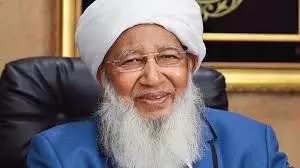Who Is Sheikh Abubakr Ahmad, the 'Grand Mufti of India'? His Role in Delaying Nimisha Priya’s Execution in Yemen Explained
Sheikh Abubakr Ahmad, known as the Grand Mufti of India, played a key role in deferring Nimisha Priya’s execution in Yemen through religious mediation. Details here.
image for illustrative purpose

In a significant development, Sheikh Abubakr Ahmad, popularly referred to as the ‘Grand Mufti of India’, has played a crucial role in postponing the scheduled execution of Indian nurse Nimisha Priya in Yemen. Priya, a 37-year-old from Kerala, was sentenced to death in 2020 for the alleged murder of her Yemeni business partner, Talal Abdo Mahdi.
⚖️ How Sheikh Abubakr Helped Defer Nimisha Priya’s Execution
Sheikh Abubakr Ahmad, also known as Kanthapuram A.P. Aboobacker Musliyar, led urgent mediation efforts with religious authorities in Yemen in the days leading up to Priya's scheduled execution on July 16. His intervention, supported by a Yemeni Sufi scholar and prompted by a request from Congress leader Chandy Oommen, contributed significantly to delaying the execution.
The Yemeni religious scholars, in contact with the victim’s family, confirmed the deferral through official communication, allowing more time for ongoing negotiations around “blood money”—a form of compensation recognized under Shariah law in Yemen.
"Islam emphasizes compassion and the power of forgiveness. I approached responsible scholars in Yemen to explore every humane option," Sheikh Abubakr told ANI.
👨⚖️ Who Is Sheikh Abubakr Ahmad?
- Age: 94
- Origin: Kozhikode, Kerala
- Title: Referred to as the ‘Grand Mufti of India’ (informal)
- Position: General Secretary, All India Sunni Jamiyyathul Ulama
- Chairman: Markaz Knowledge City, an integrated township with educational and cultural centers
Sheikh Abubakr is a prominent Sunni Muslim cleric and one of the most respected Islamic scholars in South Asia. Though India does not officially appoint a Grand Mufti, the title was symbolically conferred upon him during the Gareeb Nawaz Peace Conference in 2019 by the All India Tanzeem Ulama-e-Islam.
✊ His Stand on Key National Issues
- Opposed the Citizenship Amendment Act (CAA) but was criticised for not supporting women-led protests against it
- Welcomed the Supreme Court verdict on the Ram Janmabhoomi-Babri Masjid dispute, calling for peace and unity
- Held meetings with top Indian leaders including PM Narendra Modi and Home Minister Amit Shah in 2020, urging amendments to CAA and NRC
🔄 Efforts in the Nimisha Priya Case
Sources confirm that Sheikh Abubakr engaged Yemeni scholar Sheikh Habib Umar bin Hafiz to open dialogue with local religious authorities. These efforts led to a postponement document being shared with Indian intermediaries, enabling more time for negotiations around blood money compensation.
Under Yemeni Shariah law, the family of the murder victim has the right to pardon the accused in exchange for compensation. Nimisha Priya’s legal team and community leaders are now leveraging this clause to seek her release.
“After our request, the Yemeni scholars met and formally agreed to delay the execution to support the ongoing process,” said Sheikh Abubakr.
🏛️ Legal and Government Position
While the Indian government has stated it has limited influence in the matter due to Yemen’s legal framework, the Ministry of External Affairs has been facilitating diplomatic backchannels.
Attorney General R. Venkataramani told the Supreme Court:
“The Government of India is trying its best. We've engaged with influential sheikhs to explore every possible route.”
Meanwhile, an office has been opened at Sheikh Abubakr’s Kerala headquarters to coordinate fundraising and negotiations related to the blood money.
🧕 Who is Nimisha Priya?
- From: Palakkad, Kerala
- Profession: Nurse
- Convicted for: Killing her Yemeni business partner in 2017
- Status: Sentenced to death in 2020, appeal rejected in 2023
- Current Location: Detained in a prison in Sanaa, Yemen

